Petra Volpe The Divine Order Interview
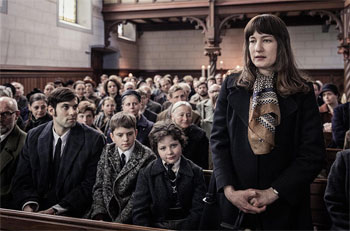
A Film By Petra Volpe
Cast: Marie Leuenberger, Maximilian Simonischek, Rachel Braunschweig
Director: Petra Biondina Volpe
Genre: Drama, Comedy
Running Time: 96 minutes
Synopsis: 1971: Nora Ruckstuhl is a young housewife and mother living with her husband HANS and their two sons Luki and Max in a small, tranquil Swiss village. Here in the countryside little is felt of the great social upheavals brought about by the 1968 movement. Nora's life is also unaffected by it; she is a quiet person, liked by everyone and never one to step out of line - until the day she starts to publicly and fiercely fight for women's suffrage, which Swiss men are to vote on, on February 7, 1971.
Nora's resistance and her need to become active for the equality of women begins when her husband at first resists and then refuses to give her permission to go back to work. The added fact that her teenage niece, Hanna, has been sent away to reform school and then a women's prison because she did not conform to the small town conventions of the village, also spurs her on. Nora realizes that it is not enough to be in favor of the vote silently, but that women need to demand it, loud and clear.
When Nora, supported by the widow and former owner of the restaurant 'Bären" Vroni, starts publically campaigning for women's right to vote and organizes an informational event on the topic, she starts a fight with Mrs. Dr. Charlotte Wipf, head of the "Anti-Politicization of Women Action Committee" and her husband's boss.
Nora, meanwhile, continually finds more allies: Graziella, a divorced Italian who took over the restaurant and opened a pizzeria, and her sister-in-law, Therese, join them. Together they prepare the event and travel to Zurich to a women's march for the right to vote. In Zurich, they also participate in a women's workshop to engage with their most intimate body parts. Nora realizes that, in addition to not being able to speak her mind as a woman in her very traditional home and village, her marital sex life is not nearly what it could be.
The greatest conflict takes place in Nora's family when Hans returns home from reserves training only to burst into Nora's event, where half the village has gathered. There stands his wife at the lectern, promoting women's right to vote, while the audience heckles her and hardly lets her speak. The event is a disaster and back at home they argue; Nora is filled with doubts about her initiative, but also about their relationship.
But she finds new courage when more and more village women dare to say out loud what they really think. Finally they decide to hold a women's strike, and Nora is overjoyed when many women in the village answer the call. This, however, stokes the hatred of their opponents, so much so that there is a violent escalation, ending the strike and causing Nora to lose her most loyal supporter.
Beaten, Nora returns home, but soon realises she can't simply return to her old life. When she is invited to a job interview, she decides to follow her innermost desire, leaving Hans with a big decision: Does he concede to Nora or does he forbid her and thus lose her? The Women's Right to Vote is passed on February 7, 1971 and Swiss women finally are given voting rights; but the women's fight for equality still continues today.
The Divine Order
Release Date: March 22nd, 2018
Trailer
Director: Petra Biondina Volpe
Genre: Drama, Comedy
Running Time: 96 minutes
Synopsis: 1971: Nora Ruckstuhl is a young housewife and mother living with her husband HANS and their two sons Luki and Max in a small, tranquil Swiss village. Here in the countryside little is felt of the great social upheavals brought about by the 1968 movement. Nora's life is also unaffected by it; she is a quiet person, liked by everyone and never one to step out of line - until the day she starts to publicly and fiercely fight for women's suffrage, which Swiss men are to vote on, on February 7, 1971.
Nora's resistance and her need to become active for the equality of women begins when her husband at first resists and then refuses to give her permission to go back to work. The added fact that her teenage niece, Hanna, has been sent away to reform school and then a women's prison because she did not conform to the small town conventions of the village, also spurs her on. Nora realizes that it is not enough to be in favor of the vote silently, but that women need to demand it, loud and clear.
When Nora, supported by the widow and former owner of the restaurant 'Bären" Vroni, starts publically campaigning for women's right to vote and organizes an informational event on the topic, she starts a fight with Mrs. Dr. Charlotte Wipf, head of the "Anti-Politicization of Women Action Committee" and her husband's boss.
Nora, meanwhile, continually finds more allies: Graziella, a divorced Italian who took over the restaurant and opened a pizzeria, and her sister-in-law, Therese, join them. Together they prepare the event and travel to Zurich to a women's march for the right to vote. In Zurich, they also participate in a women's workshop to engage with their most intimate body parts. Nora realizes that, in addition to not being able to speak her mind as a woman in her very traditional home and village, her marital sex life is not nearly what it could be.
The greatest conflict takes place in Nora's family when Hans returns home from reserves training only to burst into Nora's event, where half the village has gathered. There stands his wife at the lectern, promoting women's right to vote, while the audience heckles her and hardly lets her speak. The event is a disaster and back at home they argue; Nora is filled with doubts about her initiative, but also about their relationship.
But she finds new courage when more and more village women dare to say out loud what they really think. Finally they decide to hold a women's strike, and Nora is overjoyed when many women in the village answer the call. This, however, stokes the hatred of their opponents, so much so that there is a violent escalation, ending the strike and causing Nora to lose her most loyal supporter.
Beaten, Nora returns home, but soon realises she can't simply return to her old life. When she is invited to a job interview, she decides to follow her innermost desire, leaving Hans with a big decision: Does he concede to Nora or does he forbid her and thus lose her? The Women's Right to Vote is passed on February 7, 1971 and Swiss women finally are given voting rights; but the women's fight for equality still continues today.
The Divine Order
Release Date: March 22nd, 2018
Trailer
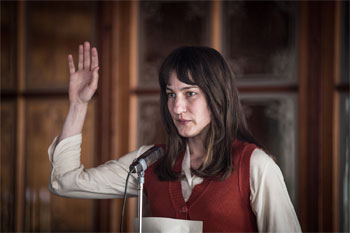 About the Production
About the Production
Petra Volpe was in preparations for her feature debut Dreamland and simultaneously writing the script to Heidi, when she began developing the idea for The Divine Order with producers Reto Schaerli and Lukas Hobi in September 2011.
The fact that Switzerland did not grant women the same political rights as men until February 1971 - as one of the last developed democracies in the world - is a well-known fact in Switzerland and beyond - and perhaps from today's perspective a curiosity.
To make a film about it was the starting point of the script development for The Divine Order. Producer Reto Schaerli: "Petra Volpe's challenge as a screenwriter for The Divine Order was to develop an independent story that didn't rest on the issue of women's suffrage. The historical circumstance is an exciting vessel, but it has to be filled with content." Petra Volpe conducted extensive research for the script. She met and interviewed important exponents of the struggle for women's suffrage.
Trogen in the canton Appenzell Ausserrhoden served as the main backdrop for filming, and while it was primarily chosen as the location for visual reasons, the two districts of Appenzell were in fact the last to grant women voting rights on the regional level in 1989 and 1990 respectively.
The fact that Switzerland did not grant women the same political rights as men until February 1971 - as one of the last developed democracies in the world - is a well-known fact in Switzerland and beyond - and perhaps from today's perspective a curiosity.
To make a film about it was the starting point of the script development for The Divine Order. Producer Reto Schaerli: "Petra Volpe's challenge as a screenwriter for The Divine Order was to develop an independent story that didn't rest on the issue of women's suffrage. The historical circumstance is an exciting vessel, but it has to be filled with content." Petra Volpe conducted extensive research for the script. She met and interviewed important exponents of the struggle for women's suffrage.
Trogen in the canton Appenzell Ausserrhoden served as the main backdrop for filming, and while it was primarily chosen as the location for visual reasons, the two districts of Appenzell were in fact the last to grant women voting rights on the regional level in 1989 and 1990 respectively.
Interview with Petra Volpe
Question: The Divine Order is the first feature film about Swiss women's suffrage and its late introduction in 1971. How did you approach the subject?
Petra Volpe: The idea to make a film about Swiss women's suffrage initially opens a very wide field. That's why I first researched for a long time, to hear as many voices as possible and to examine the subject from a variety of perspectives. Only then did I develop the characters piece by piece. All are inspired by women that I met in the course of my research. In the development of the script I especially wanted to capture the atmosphere of the time and not simply historical facts. I wanted to tell a story that depicts how unfree women were back then, how much they were treated like possessions and how great the opposition was, even in 1971, when the women demanded equal political rights.
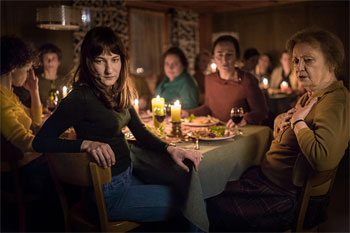 Question: Is the character Nora based on a real person?
Question: Is the character Nora based on a real person?
Petra Volpe: The idea for my protagonist Nora came from a green deposit slip in the women's suffrage opponents Gosteli archive. On it, a young housewife and mother in beautiful, careful handwriting wrote: She had never been politically involved, but this call by the opponents of the vote now made her so angry that she was even considering actively fighting for the voting right! That was the first spark for Nora, a woman who wakes up and evolves into a political person.
Question: Why did you choose to shoot in Appenzell?
Petra Volpe: The script reads: "1971 in Switzerland" - I always also imagined the film as viewed from abroad and I looked for a place that would work as a metaphor for the idea of Switzerland, and I thought Appenzell was perfect. The rolling hills with the beautiful farms, the mountain tops in the background - that is how one imagines Switzerland, and it is visually very appealing as well.
But it was also very important to me not to highlight Appenzell in particular - because one makes it too easy for oneself, whenever this issue arises, to point at this particular canton - de facto the WHOLE of Switzerland took too long in giving women the right to vote. Of course there were more progressive cantons - still, the political will was lacking until 1971 to make the issue a high priority. In an international comparison this is outrageous and hard to understand. In my opinion it has to do with the deep conservatism of our country that still becomes apparent on all kinds of issues. Considering Switzerland is a highly developed country, it to this day still struggles to keep up in terms of equality.
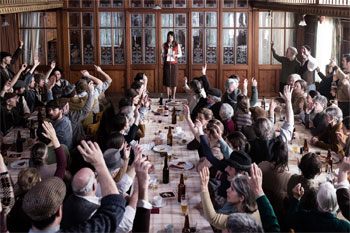 Question: How did you develop the visual style of the film?
Question: How did you develop the visual style of the film?
Petra Volpe: Three years before filming I began regularly meeting with my costume designer Linda Harper, my make-up artist Jean Cotter, my production designer Su Erdt and my cinematographer Judith Kaufmann. They all did very thorough research. We not only have countless archives but also private photo albums - we knew that in order to revive this time period, it could not seem stylized, but must be as precise as possible. The colors, furniture and costumes contribute on a basic visual level to relating the limitations with which women, but also men, lived. Both sexes are prisoners of their roles, and this is expressed in the furnishings, make-up and costume.
I also looked at material from that time for the staging of the characters. People moved differently and spoke differently. They were all much more subdued and slower. I wanted to take that into account, but in a way that wouldn't appear too slow to today's audience. That was a big challenge, and we had to rehearse a lot to find a good balance.
Question: What is the importance of the music?
Petra Volpe: That time of change is reflected particularly in the music. The music was expression of rebellion and change, and I absolutely wanted songs of iconic significance to be used in the film. The score on the other hand should reflect Nora's big transformation, accompany her journey. Annette Focks and I looked for music that acknowledged the dimension of Nora's effort within her world and gave it weight.
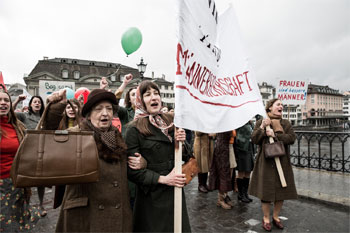 Question: Interestingly, her adversary is a woman. Why?
Question: Interestingly, her adversary is a woman. Why?
Petra Volpe: As I already mentioned the characters were inspired by the research. I read a whole dissertation on the anti-suffragettes - the opponents of the right to vote in Switzerland. From today's perspective it is difficult to fathom just why countless women in 1971 fought so hard against the vote. They were often very educated women, academics, village queens, who had established themselves very well, and maybe just didn't want their cooks to have a say as well. When you look at interviews with them, you can see an almost pleasurable demeanor of submission.
It is a common mechanism for people who have no power - they just say: We don't need the power! Women speaking out against equality in eager obedience, more vehemently than most men is a phenomenon that we can still observe today. I thought a woman who sides with the opponent was more exciting, because it raises more questions. The antagonism of the men in the story is a given, it is reflected in the mentality of the time, and in the fact that whether women would finally get full citizens' rights was dependent entirely on the male voting citizens, due to our direct democracy.
Question: How did you develop the other characters?
Petra Volpe: All characters and their stories express in which way the women were disadvantaged in society and how injustice prevailed - it was not just about the vote. Hans can by law forbid Nora to work, Vroni is dependent on her daughter because her husband squandered all their money and money was a man's business. The marriage law made women greatly dependent on their husbands and in effect made them the property of their husbands - only in 1988 was it changed on the basis of the principle of the equality of woman and man! The women characters show the effects of these legal disadvantages and how they determined the lives and biographies of the women.
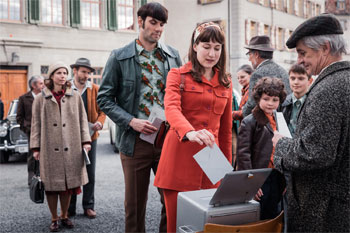 Question: Many key positions during filming (director, writer, camera, equipment, costumes, etc.) were in women's hands. Was that your intention?
Question: Many key positions during filming (director, writer, camera, equipment, costumes, etc.) were in women's hands. Was that your intention?
Petra Volpe: To me my colleagues are people first and foremost, who I appreciate for their creativity and whose work I admire. They all stand out for the strength of their work and that they have a good sense of humor and a big heart. I have male colleagues who are more feminine than me or any other woman on set; then I have women on set who are really tough. The biological sex doesn't play such a big part for me. Being a woman, being a man, these are roles you can play with, but are ultimately not that important on a fundamental human level. And yet I think it is important that women are supported. In my capacity as director I can help women get jobs, that they are given an opportunity. You just have to look at the statistics and it is evident that women remain at a disadvantage in the professional world, and that is no different in the film industry.
Question: Why this story now? Is the time ripe for it?
Petra Volpe: I recently saw a picture: An old woman holding a poster: "I can't believe I still have to protest this shit!" But we did not foresee a year ago, how extremely timely our film would be. With the rise of conservative and rightwing politics, the backlash for women and all marginalized people has of course started long before the election in America, but now it has become so painfully evident how much of our gained progress is in danger and how much more needs to be done to reach equality for all people.
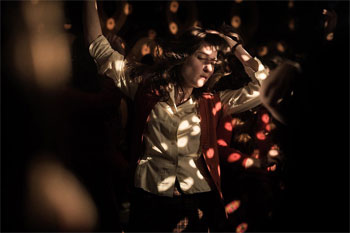 To this day men as well as women are limited by their prescribed gender roles. There is a deeply rooted internalized sexism in our society. This is detrimental to our communities on economic, social, political levels and doesn't work in anyone's favor. The more equal a society is the better it does - that is a statistical fact.
To this day men as well as women are limited by their prescribed gender roles. There is a deeply rooted internalized sexism in our society. This is detrimental to our communities on economic, social, political levels and doesn't work in anyone's favor. The more equal a society is the better it does - that is a statistical fact.
You don't have to argue for equality emotionally - you must simply look at the figures, they are staggering in some countries. And Switzerland unfortunately doesn't perform very well. In a survey by The Economist"'The Glass Ceiling Index - The best and worst places to be a working woman""Switzerland comes in fourth to last. The Council of States is 85% men. In my opinion, the equality of women should be at the very top of every political agenda"but it isn't.
But The Divine Order is also about democracy and civil courage, a very topical subject as well. Being able to vote is no matter of course, women fought hard for it, and it is a valuable prerogative that we should remember in these truly difficult times. I hope the film inspires people to do what Nora does, fight back, resist, raise their voices and make themselves heard.
Petra Volpe: The idea to make a film about Swiss women's suffrage initially opens a very wide field. That's why I first researched for a long time, to hear as many voices as possible and to examine the subject from a variety of perspectives. Only then did I develop the characters piece by piece. All are inspired by women that I met in the course of my research. In the development of the script I especially wanted to capture the atmosphere of the time and not simply historical facts. I wanted to tell a story that depicts how unfree women were back then, how much they were treated like possessions and how great the opposition was, even in 1971, when the women demanded equal political rights.
 Question: Is the character Nora based on a real person?
Question: Is the character Nora based on a real person? Petra Volpe: The idea for my protagonist Nora came from a green deposit slip in the women's suffrage opponents Gosteli archive. On it, a young housewife and mother in beautiful, careful handwriting wrote: She had never been politically involved, but this call by the opponents of the vote now made her so angry that she was even considering actively fighting for the voting right! That was the first spark for Nora, a woman who wakes up and evolves into a political person.
Question: Why did you choose to shoot in Appenzell?
Petra Volpe: The script reads: "1971 in Switzerland" - I always also imagined the film as viewed from abroad and I looked for a place that would work as a metaphor for the idea of Switzerland, and I thought Appenzell was perfect. The rolling hills with the beautiful farms, the mountain tops in the background - that is how one imagines Switzerland, and it is visually very appealing as well.
But it was also very important to me not to highlight Appenzell in particular - because one makes it too easy for oneself, whenever this issue arises, to point at this particular canton - de facto the WHOLE of Switzerland took too long in giving women the right to vote. Of course there were more progressive cantons - still, the political will was lacking until 1971 to make the issue a high priority. In an international comparison this is outrageous and hard to understand. In my opinion it has to do with the deep conservatism of our country that still becomes apparent on all kinds of issues. Considering Switzerland is a highly developed country, it to this day still struggles to keep up in terms of equality.
 Question: How did you develop the visual style of the film?
Question: How did you develop the visual style of the film? Petra Volpe: Three years before filming I began regularly meeting with my costume designer Linda Harper, my make-up artist Jean Cotter, my production designer Su Erdt and my cinematographer Judith Kaufmann. They all did very thorough research. We not only have countless archives but also private photo albums - we knew that in order to revive this time period, it could not seem stylized, but must be as precise as possible. The colors, furniture and costumes contribute on a basic visual level to relating the limitations with which women, but also men, lived. Both sexes are prisoners of their roles, and this is expressed in the furnishings, make-up and costume.
I also looked at material from that time for the staging of the characters. People moved differently and spoke differently. They were all much more subdued and slower. I wanted to take that into account, but in a way that wouldn't appear too slow to today's audience. That was a big challenge, and we had to rehearse a lot to find a good balance.
Question: What is the importance of the music?
Petra Volpe: That time of change is reflected particularly in the music. The music was expression of rebellion and change, and I absolutely wanted songs of iconic significance to be used in the film. The score on the other hand should reflect Nora's big transformation, accompany her journey. Annette Focks and I looked for music that acknowledged the dimension of Nora's effort within her world and gave it weight.
 Question: Interestingly, her adversary is a woman. Why?
Question: Interestingly, her adversary is a woman. Why? Petra Volpe: As I already mentioned the characters were inspired by the research. I read a whole dissertation on the anti-suffragettes - the opponents of the right to vote in Switzerland. From today's perspective it is difficult to fathom just why countless women in 1971 fought so hard against the vote. They were often very educated women, academics, village queens, who had established themselves very well, and maybe just didn't want their cooks to have a say as well. When you look at interviews with them, you can see an almost pleasurable demeanor of submission.
It is a common mechanism for people who have no power - they just say: We don't need the power! Women speaking out against equality in eager obedience, more vehemently than most men is a phenomenon that we can still observe today. I thought a woman who sides with the opponent was more exciting, because it raises more questions. The antagonism of the men in the story is a given, it is reflected in the mentality of the time, and in the fact that whether women would finally get full citizens' rights was dependent entirely on the male voting citizens, due to our direct democracy.
Question: How did you develop the other characters?
Petra Volpe: All characters and their stories express in which way the women were disadvantaged in society and how injustice prevailed - it was not just about the vote. Hans can by law forbid Nora to work, Vroni is dependent on her daughter because her husband squandered all their money and money was a man's business. The marriage law made women greatly dependent on their husbands and in effect made them the property of their husbands - only in 1988 was it changed on the basis of the principle of the equality of woman and man! The women characters show the effects of these legal disadvantages and how they determined the lives and biographies of the women.
 Question: Many key positions during filming (director, writer, camera, equipment, costumes, etc.) were in women's hands. Was that your intention?
Question: Many key positions during filming (director, writer, camera, equipment, costumes, etc.) were in women's hands. Was that your intention? Petra Volpe: To me my colleagues are people first and foremost, who I appreciate for their creativity and whose work I admire. They all stand out for the strength of their work and that they have a good sense of humor and a big heart. I have male colleagues who are more feminine than me or any other woman on set; then I have women on set who are really tough. The biological sex doesn't play such a big part for me. Being a woman, being a man, these are roles you can play with, but are ultimately not that important on a fundamental human level. And yet I think it is important that women are supported. In my capacity as director I can help women get jobs, that they are given an opportunity. You just have to look at the statistics and it is evident that women remain at a disadvantage in the professional world, and that is no different in the film industry.
Question: Why this story now? Is the time ripe for it?
Petra Volpe: I recently saw a picture: An old woman holding a poster: "I can't believe I still have to protest this shit!" But we did not foresee a year ago, how extremely timely our film would be. With the rise of conservative and rightwing politics, the backlash for women and all marginalized people has of course started long before the election in America, but now it has become so painfully evident how much of our gained progress is in danger and how much more needs to be done to reach equality for all people.
 To this day men as well as women are limited by their prescribed gender roles. There is a deeply rooted internalized sexism in our society. This is detrimental to our communities on economic, social, political levels and doesn't work in anyone's favor. The more equal a society is the better it does - that is a statistical fact.
To this day men as well as women are limited by their prescribed gender roles. There is a deeply rooted internalized sexism in our society. This is detrimental to our communities on economic, social, political levels and doesn't work in anyone's favor. The more equal a society is the better it does - that is a statistical fact. You don't have to argue for equality emotionally - you must simply look at the figures, they are staggering in some countries. And Switzerland unfortunately doesn't perform very well. In a survey by The Economist"'The Glass Ceiling Index - The best and worst places to be a working woman""Switzerland comes in fourth to last. The Council of States is 85% men. In my opinion, the equality of women should be at the very top of every political agenda"but it isn't.
But The Divine Order is also about democracy and civil courage, a very topical subject as well. Being able to vote is no matter of course, women fought hard for it, and it is a valuable prerogative that we should remember in these truly difficult times. I hope the film inspires people to do what Nora does, fight back, resist, raise their voices and make themselves heard.
MORE
- Mission: Impossible Fallout
- Glenn Close The Wife
- Allison Chhorn Stanley's Mouth Interview
- Benicio Del Toro Sicario: Day of the Soldado
- Dame Judi Dench Tea With The Dames
- Sandra Bullock Ocean's 8
- Chris Pratt Jurassic World: Fallen Kingdom
- Claudia Sangiorgi Dalimore and Michelle Grace...
- Rachel McAdams Disobedience Interview
- Sebastián Lelio and Alessandro Nivola...
- Perri Cummings Trench Interview



